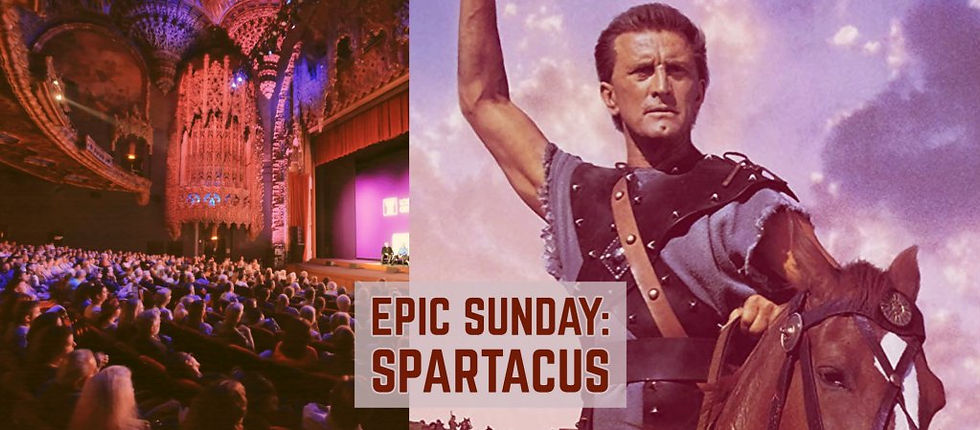Epic Sunday: Spartacus at The Theatre at Ace Hotel
- Carrie Specht

- May 15, 2019
- 3 min read
What makes this screening epic? At more than three hours, Spartacus’ length is epic enough, but that’s not the only thing that makes the Sunday afternoon event extraordinary. The star-studded cast includes Kirk Douglas (The Vikings, Lust for Life) as the title character, the leader of a slave revolt against the Roman Republic in 1st century BC. The film also stars the legendary Laurence Olivier (Rebecca, Hamlet), Jean Simmons (Guys and Dolls, Elmer Gantry), Charles Laughton (The Hunchback of Notre Dame, The Witness for the Prosecution), Peter Ustinov (Quo Vadis, Topkapi), John Gavin (Psycho, Thoroughly Modern Milly), and Tony Curtis (Some Like It Hot, Sweet Smell of Success). And then there's the legendary director Stanley Kubrick (2001: A Space Odyssey, The Shinning), who received such wide acclaim the film established him as an "A" list director from that point forward. He’d already directed several other features, but this was by far the largest and most notable project he’d directed up to that point.

Of course, it didn't hurt that the film was written by the famed screenwriter, Dalton Trumbo (Roman Holiday, Papillon). He had been one of Hollywood’s highest-paid screenwriters up until the early the 1940s, but was blacklisted by the House UnAmerican Activities (HUA) committee due to his alleged involvement with the Communist Party. He continued working by using the names of other writers and pseudonyms, but it wasn't until the film's star, Kirk Douglas, insisted that Trumbo get full screen credit for Spartacus. That action broke the "Hollywood Blacklist". And. in 1960, it was the first film credited to him under his real name since 1945.

The enormous production took place over 167 days in both Hollywood and Spain. The film employed over 50,000 extras and 187 stuntmen who were trained in gladiator combat. With a budget of $12 million, it was the most expensive American film ever made at the time of its release. It seems like a pretty small amount of money for a Hollywood feature film, but when you adjust that amount by today's dollar the value is actually $105 million. That's a lot of spectacle on the giant wide-screens of the day. Audiences probably felt as if the slave revolt was about to spill over into their very laps.

And then there's the incredible venue in which this larger than life epic will be playing: The Theater at the Ace Hotel. The 1927 theatre was originally constructed as the flagship for the United Artist’s West Coast operations. Established in 1919, director D. W. Griffith and screen stars Mary Pickford, Douglas Fairbanks, and Charlie Chaplin broke from the studio system to form UA. And the Ace was where they showcased films made by other independent stars and filmmakers who no longer wanted to work under the control of the major studios. The auditorium is designed to resemble a Spanish Gothic grotto, and the walls of the upper balconies feature murals depicting UA’s founders. Now a historic landmark, this gorgeous theatre was fully restored in 2013.
With all that going for it, I don't see how you can chose to miss out on such a cinematic experience. The folks at Last Remaining Seats hope the classic film fans of Los Angeles will join them for this epic screening at the Theatre at Ace Hotel in downtown L.A Sunday, June 16 at 3:00 PM (doors 2:00 PM). I hope you do as well. I saw this film for the first time on a giant theater screen, and the memory of it has lasted for more than thirty years. I hope you have the same treasured memory thirty years from now.





Comments